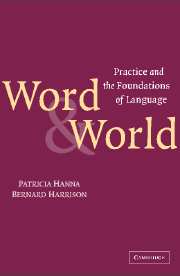Book contents
- Frontmatter
- Contents
- Preface
- Introduction
- PART I SCEPTICISM AND LANGUAGE
- PART II NAMES AND THEIR BEARERS
- 4 Russell's Principle and Wittgenstein's Slogan
- 5 The Name-Tracking Network
- 6 Rigidity
- 7 Descriptions and Causes
- 8 Knowledge of Rules
- PART III PROPOSITIONS
- PART IV PARADOXES OF INTERPRETATION
- EPILOGUE
- Notes
- Index
5 - The Name-Tracking Network
Published online by Cambridge University Press: 05 June 2012
- Frontmatter
- Contents
- Preface
- Introduction
- PART I SCEPTICISM AND LANGUAGE
- PART II NAMES AND THEIR BEARERS
- 4 Russell's Principle and Wittgenstein's Slogan
- 5 The Name-Tracking Network
- 6 Rigidity
- 7 Descriptions and Causes
- 8 Knowledge of Rules
- PART III PROPOSITIONS
- PART IV PARADOXES OF INTERPRETATION
- EPILOGUE
- Notes
- Index
Summary
Nomothetic objects
Russell's Principle in Russell's version is the dictum that “Every proposition which we can understand must be composed wholly of constituents with which we are acquainted.” In Gareth Evans's version, it is the more or less equivalent claim that it is possible for a person to have a thought about something only if he knows which particular individual in the world he is thinking about, with the rider that at some point the phrase “which individual” will have to be spelled out in terms of sensory acquaintance if the demands of the principle are to be met.
It is worth noticing right at the outset, therefore, that there are types of reference and referring expression to which neither version of the Principle appears to have any application whatsoever. Take for instance, the sentence “The King can move one square in any direction.”
“The King” is a referring expression. It picks out an object, the chess-King. It would be possible, for that matter, to envisage a chess nomenclature in which, rather than being indicated by means of definite descriptions, “The White King,” “The White Queen's Bishop,” “The White Queen's Knight's Pawn,” and so on, the objects so indicated would be baptised with proper names: “King George,” “Queen Mary,” “Kaiser Wilhelm,” “Bishop Wilberforce,” and so on.
The identity of the object picked out by the definite description “The White King,” or by an equivalent proper name, however, neither needs to be explained, nor could be explained, “by acquaintance.”
- Type
- Chapter
- Information
- Word and WorldPractice and the Foundations of Language, pp. 95 - 125Publisher: Cambridge University PressPrint publication year: 2003



